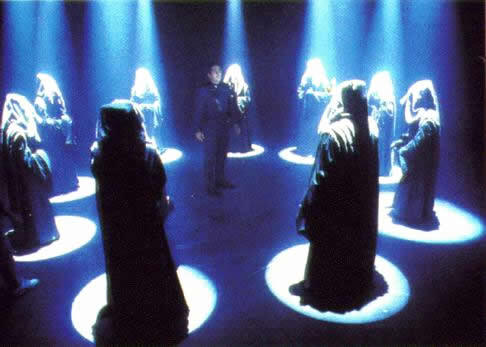
The Council has spoken, the votes have been cast, and the results are in for this week's Watcher's Council match up.
"Good name in man and woman, dear my lord,
Is the immediate jewel of their souls.
Who steals my purse steals trash; 'tis something, nothing;
'Twas mine, 'tis his, and has been slave to thousands;
But he that filches from me my good name
Robs me of that which not enriches him,
And makes me poor indeed." - William Shakespeare in 'Othello'
"The conservative-media revolution has caused the liberal media to abandon any pretense of objectivity and fairness and actively advocate on the Left’s behalf."
- Rush Limbaugh
"My soul followeth hard after thee: thy right hand upholdeth me. But those that seek my soul, to destroy it, shall go into the lower parts of the earth. They shall fall by the sword: they shall be a portion for foxes. - Psalm 63:10

This week's winning essay,Bookworm Room's -The New York Times’ latest attack on Ted Cruz backfires, highlighting his virtues is pretty much about what the title implies it is as Bookworm turns the tables on Pravda-by-the-Hudson's execrable Frank Bruni's pathetic attempt at character assassination. Here's a slice:
Early last week, the New York Times published Frank Bruni’s overwrought essay, Anyone But Ted Cruz. The piece is clearly meant to assassinate Ted Cruz’s character by explaining why conservative voters should hate and fear him as much as Progressives do.
As a preliminary matter, of course, any conservative who accepts advice from the New York Times about preferred Republican candidates is a fool. The Times does not have Republicans’ best interests at heart, and the past fifteen years make it highly questionable whether it has America’s best interests at heart either. Listening to the Times’ advice about Republican candidates is kind of like taking dating advice from Ted Bundy.
But back to Bruni. . . . After opening with some quick character assassination from the Left, Bruni works hard to explain that it’s not only the obvious suspects – i.e., Leftists – who dislike Cruz, but Republicans as well. His opinion piece is basically a “Dear Conservative voter” letter, claiming that, if these savvy Republican political figures hate Cruz, you, the voter, should too.
Bruni’s problem is that his explanations for Cruz’s unpopularity with Washington D.C.’s “in-crowd” Republicans manage to establish that Cruz has dedicated his entire adult life to advancing American constitutionalism and exceptionalism, notions that mainstream Republicans abandoned long ago. Thus, for anyone who rejects the Leftist and establishment assumptions underlying Bruni’s hit piece, it’s obvious that, during these troubled times at home and abroad, Ted Cruz is not ballot box poison. Instead, he is the best man to return America to her core values of personal liberty, economic freedom, and national security policies that benefit America and her friends.
There are, of course, some virtues Cruz possesses that no one can deny. Like the defense attorney who tries to immunize his client against the most damning facts by ingenuously acknowledging them when trial begins, Bruni opens his latest piece by accepting that Cruz is likely the ‘smartest man in the room’:
He’s clearly brilliant — maybe smarter than any of the others. He’s a whirlwind of energy. And man oh man can he give a presentation. On any subject, he’s informed, inflamed, precise.
Bruni’s statement comports with the opinion of many people who actually know Ted Cruz, including famed liberal Harvard Law Professor Alan Dershowitz. So what is Bruni’s problem with Ted Cruz?
But then you talk with people who’ve worked with [Cruz] at various stages of his career. They dislike him.
No, scratch that.
They loathe him.
Let’s leave aside for a moment whether personal popularity — or skin color or type of sexual organs — should be a reason to vote for a person for President, since the job description for President is based on precisely none of those characteristics. Let’s also ignore for now that the practical experience we’ve gained from our recent experiment in voting for a President based on skin color shows how dangerous identity voting is. Instead, let’s examine at face value Bruni’s claim that Cruz’s lack of popularity should be disqualifying, complete with its insinuation that the lack of popularity arises from some sort of deep, dark character flaw.
Bruni certainly makes the case that Cruz is a polarizing figure in a political world in which Progressives take no prisoners and old-line Republicans valiantly try not to upset the Washington establishment apple cart. The real question for thoughtful voters is whether Cruz is “loathed,” not because he’s loathsome, but because he unnerves the people who need to be unnerved. That question requires delving more deeply into why Congress people, on both the Left and the Right, dislike Cruz.
To explain his own side’s hatred for Cruz, Bruni briefly looks to a Daily Beast article that reveals that, during Cruz’s first year at uber-liberal Princeton College, his roommate did not particularly like him:
His freshman roommate, Craig Mazin, told Patricia Murphy of The Daily Beast: “I would rather have anybody else be the president of the United States. Anyone. I would rather pick somebody from the phone book.
Given that so many hate Cruz for being an unrepentant Constitutional conservative idealist, it is ironic that Bruni’s choice of Mazin’s quotable quote, wittingly or not, plays on arch-conservative William F. Buckley’s famous quip, “I would sooner be governed by the first four hundred names in the Boston telephone directory than by the four hundred members of the faculty of Harvard.” Neither Bruni nor the Daily Beast author seem to pick up on that irony.
Bruni quickly abandons The Daily Beast article to get to the meat of his piece, which is to explain why Republicans also hate Cruz. Before we do the same, it’s worthwhile to delve deeper into the Daily Beast article, both because it explains why Mazin hated his roommate and because (obviously unwittingly from The Daily Beast’s world view) it gives valuable – and highly flattering – insight into the young Cruz.
First, at least as far as The Daily Beast article is concerned, we learn that seemingly the only substantive reason for Mazin’s disliking Cruz was that the 17-year-old Cruz was reading a rather startling book:
“I remember very specifically that he had a book in Spanish and the title was Was Karl Marx a Satanist? And I thought, who is this person?” Mazin says of Ted Cruz. “Even in 1988, he was politically extreme in a way that was surprising to me.”
Wow! A 17-year-old kid – more accurately, a 17-year-old bilingual kid – was reading a wacky book. For Progressives and mainline Republicans, that’s certainly a reason to hate him twenty-seven years later.
As an aside, Karl Marx probably wasn’t a Satanist, but he was most certainly a hate-filled anti-Semite whose writing unleashed a worldwide killing spree that, over 150 years, has murdered hundreds of millions of people everywhere from Russia to China to Germany to North Korea to all points in between. The irony is that few people today would label as extremists those who read Karl Marx or, worse, who think he’s brilliant. Instead, these people are just referred to as “Bernie Sanders supporters.”
The Daily Beast article reveals something more interesting than a silly book, which is that, when young Cruz erred, he then repented and reformed, at great cost to himself:
Cruz also angered a number of upperclassmen his freshman year when he joined in a regular poker game and quickly ran up $1,800 in debt to other students from his losses. Cruz’s spokeswoman, Catherine Frazier, said Cruz acknowledges playing in the poker games, which he now considers “foolish.”
He went to his aunt, who worked at a bank in Dallas, and borrowed $1,800 from her, which he paid in cash and promptly quit the game,” Frazier told The Daily Beast, explaining that Cruz worked two jobs and made monthly payments to his aunt for the next two years to repay the debt.
So to recap: a 17-year-old away from home for the first time foolishly gambled away money he did not have. Rather than walking away from what the British used to call “a debt of honor” or passing the debt on to his parents, he instead went to a reliable person for a loan, fully repaid his gambling debt, and then worked extremely hard to repay his loan. Moreover, there’s no indication that Cruz subsequently had a gambling problem. So not only did he face up to his failure, he learned from it. Call me old-fashioned, but that strikes me as laudable, not disgraceful, conduct.
Nor, despite Princeton’s overwhelmingly Progressive student body and faculty, was Cruz without friends:
While Cruz may have been disliked, and intensely so, by many of his classmates, he found a close and longtime friend in a gregarious, popular student from Jamaica named David Panton, who became Cruz’s tag-team partner on Princeton’s renowned debate squad, as well as his roommate for the remainder of their time at Princeton and when they both attended Harvard Law School.
Unlike what others may say, I consider Ted to be very kind. He is a very, very gentle-hearted person,” Panton told The Daily Beast. “He took me under his wing and was a mentor to me. He was very kind to me. I am a much smarter and much better person today because of Ted Cruz.”
Panton’s statement is a lovely encomium. Additionally, given our nation’s current obsession with identity politics, it seems worthwhile to point out something about the Jamaican-born Panton: he’s black. In other words, both Panton, who had a Hispanic friend in Cruz, and Cruz, who had a black friend in Panton, truly heeded Martin Luther King’s dictum, with each judging the other by the content of his character, rather than by the color of his skin. That speaks well of both men, who at a young age already had a principled belief that character matters.
Cruz and Panton were a dynamic debating duo, and their experience shows that Cruz was indeed brilliant, that he was socially comfortable, that he worked extremely hard, and that he was willing to mentor others to help them along as well
Cruz and Panton debated together for four years at Princeton and came to dominate the collegiate parliamentary debate circuit, winning the North American championships in 1992 and being named the top two collegiate debaters in the country (Cruz was No. 1). The competitive debate world also gave Cruz a different social circle, with fellow debaters congregating in his room to hang out and play Super Mario Bros. Debate weekends included Friday night parties that Cruz often attended, where he was remembered to be “sort of a stud” with girls on the debate circuit. Princeton debaters also said he spent extra time mentoring them to improve their skills, even though they competed against each other.
Cruz’s long-term friendship with Panton allows Panton to offer a deeper insight about Cruz than we get from Mazin’s simplistic scorn regarding Cruz’s reading material. It turns out that, as his supporters have known all along, Cruz is a bone deep conservative, as opposed to the unprincipled weathervane many in the GOP are trying to suggest that he is:
Throughout those years, Cruz and Panton remained friends, and Panton still speaks highly of him, saying with praise that the one word that describes Cruz best is “consistent.”
He’s not someone who shifts in the wind,” Panton says. “The Ted Cruz that I knew at 17 years old is exactly the same as the Ted Cruz I know at 42 years old. He was very conservative then, and an outspoken conservative. He remains strongly conservative today.”
Even at a young age, Cruz understood what his conservativism was about. Unlike today’s screeching Progressive college students, Cruz wasn’t a conservative because it was trendy (which it wasn’t during his time at Princeton, just as it isn’t now), nor was he unthinkingly following his parents’ lead, as so many less politically aware young people do. Instead, he delved deep into his ideas:
That [conservative] consistency reveals itself in Cruz’s senior thesis, which he completed under the mentorship of Robert George, a professor of jurisprudence whom The New York Times called “the reigning brain of the Christian right.” [Talk about your dog whistles.]
Cruz’s thesis, “Clipping the Wings of Angels,” quoted James Madison in the Federalist Papers saying in part that, “If men were angels, no government would be necessary.” Cruz focused on the history and theory behind the Ninth and 10th [sic] Amendments in a constitutional defense that reads like a speech he could give at any Tea Party event in the country.
The time-capsule quality of Cruz’s politics is lost on no one who knew him at Princeton, none of whom could point to a political position that he held 25 years ago that he does not seem to still hold today. For some, that amounts to a laudably consistent belief system. For others, it reveals a man of calcified thinking, dangerously impervious to facts, reality, and a changing world.
For Progressives, it is damning that Sen. Cruz has not “evolved” and, instead, has remained “dangerously impervious to facts, reality and a changing world.” That indictment is true, however, only if one is holding the wrong idea for too long.
More at the link.
In our non-Council category, the winner was Sharyl Atkisson in the with an extraordinary piece, The “Post Truth” News Media submitted by Joshuapundit. In it, the veteran investigative reporter gives us nothing less than a detailed analysis of how the news media got to its present sordid state, where it is and how it works today and the various techniques it uses to distort the news for partisan political purposes. A must read.
Here are this week’s full results:
Council Winners
- *First place with 3 1/3 votes!-Bookworm Room – The New York Times’ latest attack on Ted Cruz backfires, highlighting his virtues
- Second place with 3 votes – The Noisy Room –ISIS Plots World Domination… Obama Color Codes It
- Third place *t* with 2 1/3 votes –The Right Planet – Islamic Attack on San Bernardino: Why It Happened and What to Do
- Third place *t* with 2 1/3 votes –Joshuapundit-The Heart Of The Matter
- Fourth place *t* with 1 vote –VA Right! - San Bernardino Proves Muslims Are Peaceful – Right Up Until They Start Shooting
- Fourth place *t* with 1 vote –Maggie's Notebook–Rabid Anti-Semite of Syrian Descent to Advise on ISIS: Robert Malley, Hamas Supporter, Fired by Obama, Rehired by Obama
- Fifth place with 2/3 vote –The Independent Sentinel – Another Socialist Paradise Goes Down for the Count
- Sixth place *t* with 1/3 vote –Fausta's Blog – Venezuela: Opposition gets qualified majority. What next?
- Sixth place *t* with 1/3 vote –The Razor – The Watch
Non-Council Winners
- First place with 3 1/3 votes! –Sharyl Attkisson – The “Post Truth” News Media submitted by Joshuapundit
- Second place with 2 2/3 votes – Andrew McCarthy/NRO -Trump’s Muslim Immigration Ban Should Touch Off a Badly Needed Discussion submitted by Nice Deb
- Third place with 1 2/3 votes –Michael Doran/Mosaic-Our Man In Moscowsubmitted by Bookworm Room li> Fourth place with 1 1/3 votes –Michael Walsh/PJ Media – End The War With ISIS Now submitted by The Glittering Eye
- Fifth place *t* with 1 vote -Larry Correia/Monster Hunter Nation –Guns And Vultures submitted by The Noisy Room
- Fifth place *t* with 1 vote -Mark Perry/Strategy Bridge – What Would Clausewitz Do? submitted by GrEaT sAtAn”S gIrLfRiEnD
- Sixth place with 2/3 votes -Judicial Watch–New Benghazi Email Shows DOD Offered State Department “Forces that Could Move to Benghazi” Immediately – Specifics Blacked Out in New Document submitted by The Watcher
- Seventh place *t* with 1/3 vote -Daniel Greenfield/FrontPage – Carter Banned Iranians From Coming To The US During Hostage Crisissubmitted by VA Right!
- Seventh place *t* with 1/3 vote -PopeHat –Talking Productively About Guns submitted by The Razor
- Seventh place *t* with 1/3 vote -Nidra Poller/The New English Review – What Do They Want? submitted by The Watcher
- Seventh place *t* with 1/3 vote - Politically Short – Islam, Jihad, and our Ignorance submitted by The Right Planet
See you next week!
Make sure to tune in every Monday for the Watcher’s Forum. and every Tuesday morning, when we reveal the weeks' nominees for Weasel of the Week!
And remember, every Wednesday, the Council has its weekly contest with the members nominating two posts each, one written by themselves and one written by someone from outside the group for consideration by the whole Council. The votes are cast by the Council, and the results are posted on Friday morning.
It’s a weekly magazine of some of the best stuff written in the blogosphere, and you won’t want to miss it...or any of the other fantabulous Watcher's Council content.
And don’t forget to like us on Facebook and follow us on Twitter..’cause we’re cool like that, y'know?






No comments:
Post a Comment